The Impact of Autism on Early Childhood Education: A Detailed Report
VerifiedAdded on 2022/08/20
|9
|2726
|21
Report
AI Summary
This report delves into the significant impact of autism on early childhood education, focusing on the challenges faced by autistic children and the importance of inclusive educational settings. It highlights the difficulties these children encounter, including social, communication, and sensory issues, and emphasizes the need for tailored support. The report discusses the rights of autistic children to education, as outlined by the United Nations Convention on the Rights of the Child, and the benefits of inclusive education for both children with and without disabilities. It examines the impact of autism on various stakeholders, including parents, teachers, and the children themselves, and proposes planning steps such as visual aids, quiet spaces, and community playgroups. The report underscores the necessity of understanding and addressing the unique needs of autistic children to foster their development and ensure their inclusion in the education system. It suggests that early intervention and supportive environments are crucial for helping autistic children thrive and develop essential life skills, while also promoting empathy and understanding among their peers.
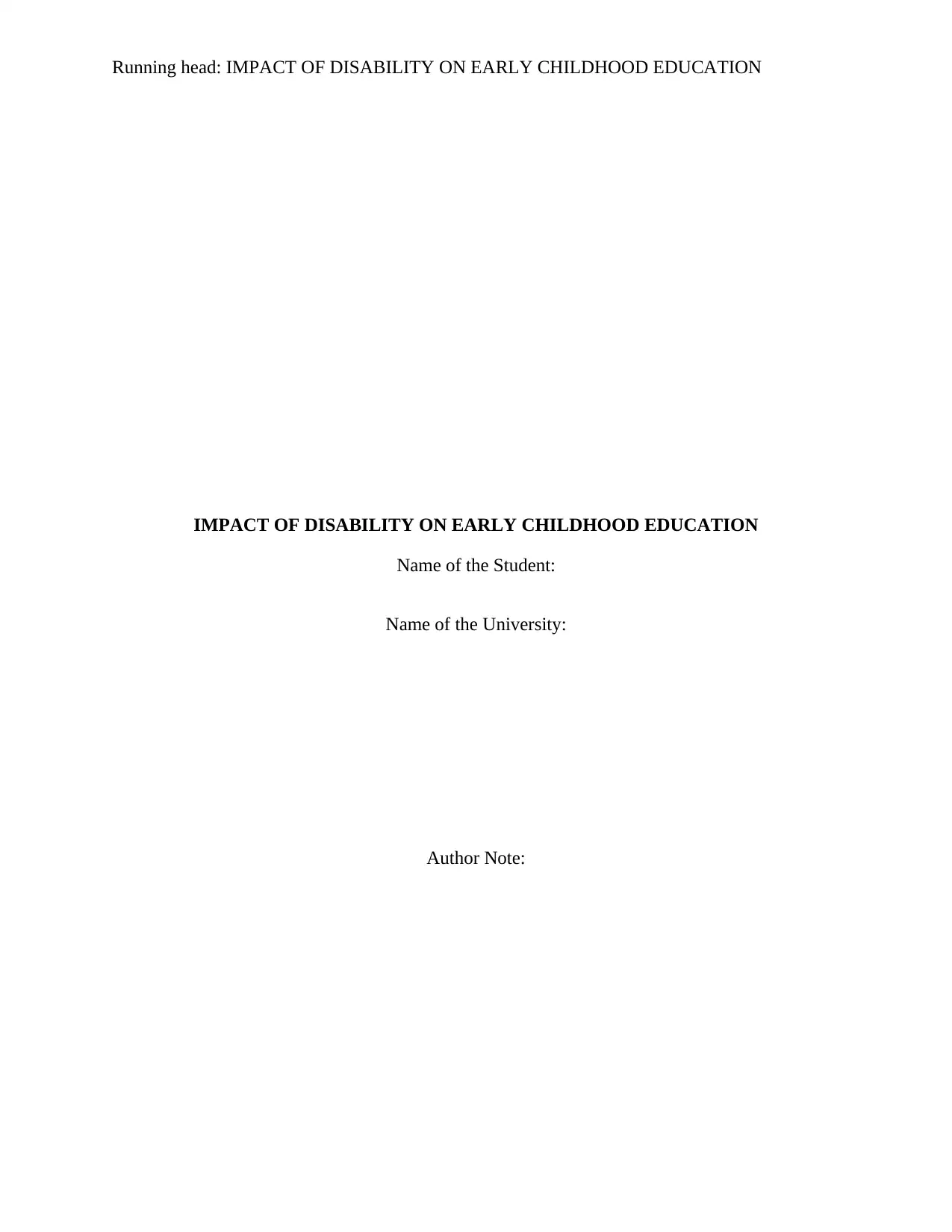
Running head: IMPACT OF DISABILITY ON EARLY CHILDHOOD EDUCATION
IMPACT OF DISABILITY ON EARLY CHILDHOOD EDUCATION
Name of the Student:
Name of the University:
Author Note:
IMPACT OF DISABILITY ON EARLY CHILDHOOD EDUCATION
Name of the Student:
Name of the University:
Author Note:
Paraphrase This Document
Need a fresh take? Get an instant paraphrase of this document with our AI Paraphraser
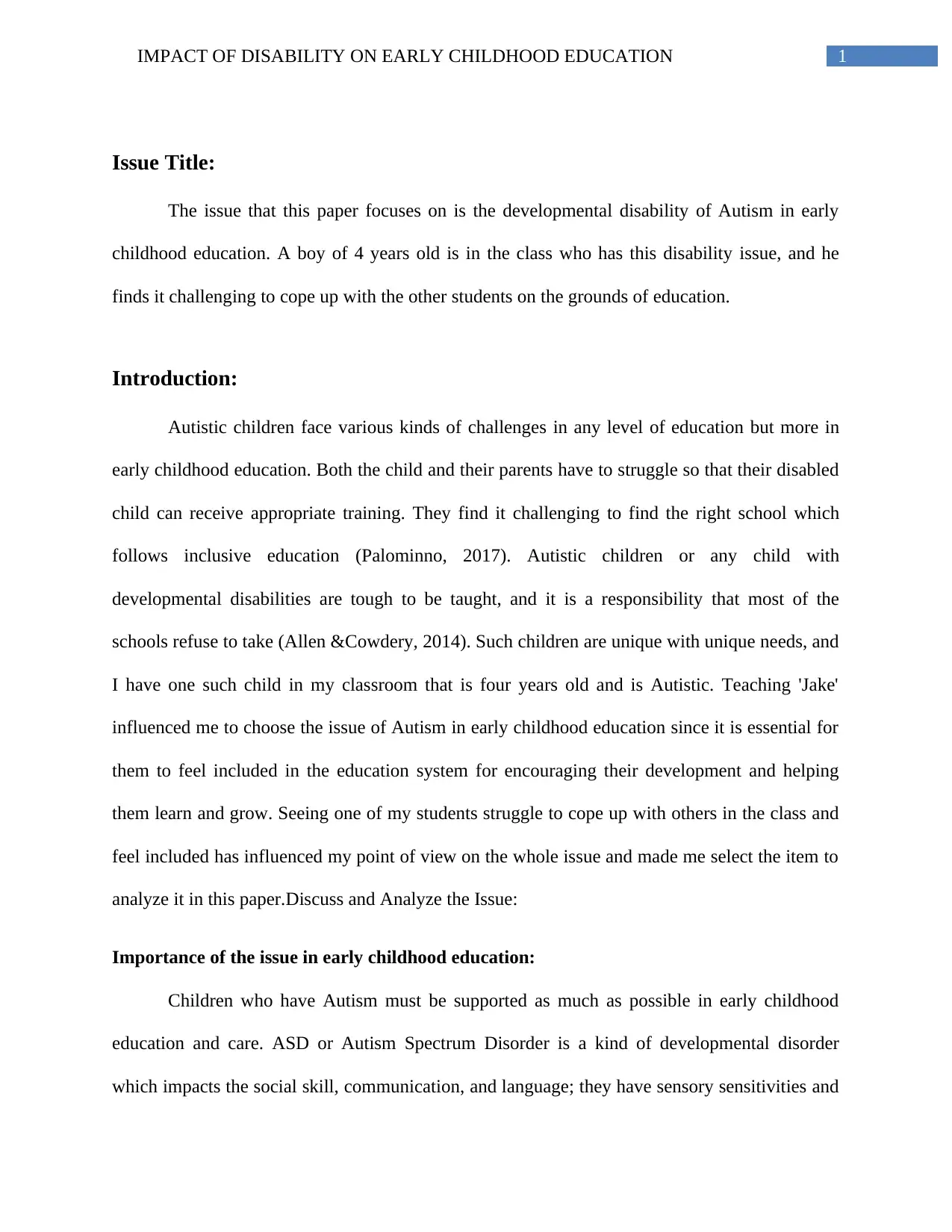
1IMPACT OF DISABILITY ON EARLY CHILDHOOD EDUCATION
Issue Title:
The issue that this paper focuses on is the developmental disability of Autism in early
childhood education. A boy of 4 years old is in the class who has this disability issue, and he
finds it challenging to cope up with the other students on the grounds of education.
Introduction:
Autistic children face various kinds of challenges in any level of education but more in
early childhood education. Both the child and their parents have to struggle so that their disabled
child can receive appropriate training. They find it challenging to find the right school which
follows inclusive education (Palominno, 2017). Autistic children or any child with
developmental disabilities are tough to be taught, and it is a responsibility that most of the
schools refuse to take (Allen &Cowdery, 2014). Such children are unique with unique needs, and
I have one such child in my classroom that is four years old and is Autistic. Teaching 'Jake'
influenced me to choose the issue of Autism in early childhood education since it is essential for
them to feel included in the education system for encouraging their development and helping
them learn and grow. Seeing one of my students struggle to cope up with others in the class and
feel included has influenced my point of view on the whole issue and made me select the item to
analyze it in this paper.Discuss and Analyze the Issue:
Importance of the issue in early childhood education:
Children who have Autism must be supported as much as possible in early childhood
education and care. ASD or Autism Spectrum Disorder is a kind of developmental disorder
which impacts the social skill, communication, and language; they have sensory sensitivities and
Issue Title:
The issue that this paper focuses on is the developmental disability of Autism in early
childhood education. A boy of 4 years old is in the class who has this disability issue, and he
finds it challenging to cope up with the other students on the grounds of education.
Introduction:
Autistic children face various kinds of challenges in any level of education but more in
early childhood education. Both the child and their parents have to struggle so that their disabled
child can receive appropriate training. They find it challenging to find the right school which
follows inclusive education (Palominno, 2017). Autistic children or any child with
developmental disabilities are tough to be taught, and it is a responsibility that most of the
schools refuse to take (Allen &Cowdery, 2014). Such children are unique with unique needs, and
I have one such child in my classroom that is four years old and is Autistic. Teaching 'Jake'
influenced me to choose the issue of Autism in early childhood education since it is essential for
them to feel included in the education system for encouraging their development and helping
them learn and grow. Seeing one of my students struggle to cope up with others in the class and
feel included has influenced my point of view on the whole issue and made me select the item to
analyze it in this paper.Discuss and Analyze the Issue:
Importance of the issue in early childhood education:
Children who have Autism must be supported as much as possible in early childhood
education and care. ASD or Autism Spectrum Disorder is a kind of developmental disorder
which impacts the social skill, communication, and language; they have sensory sensitivities and
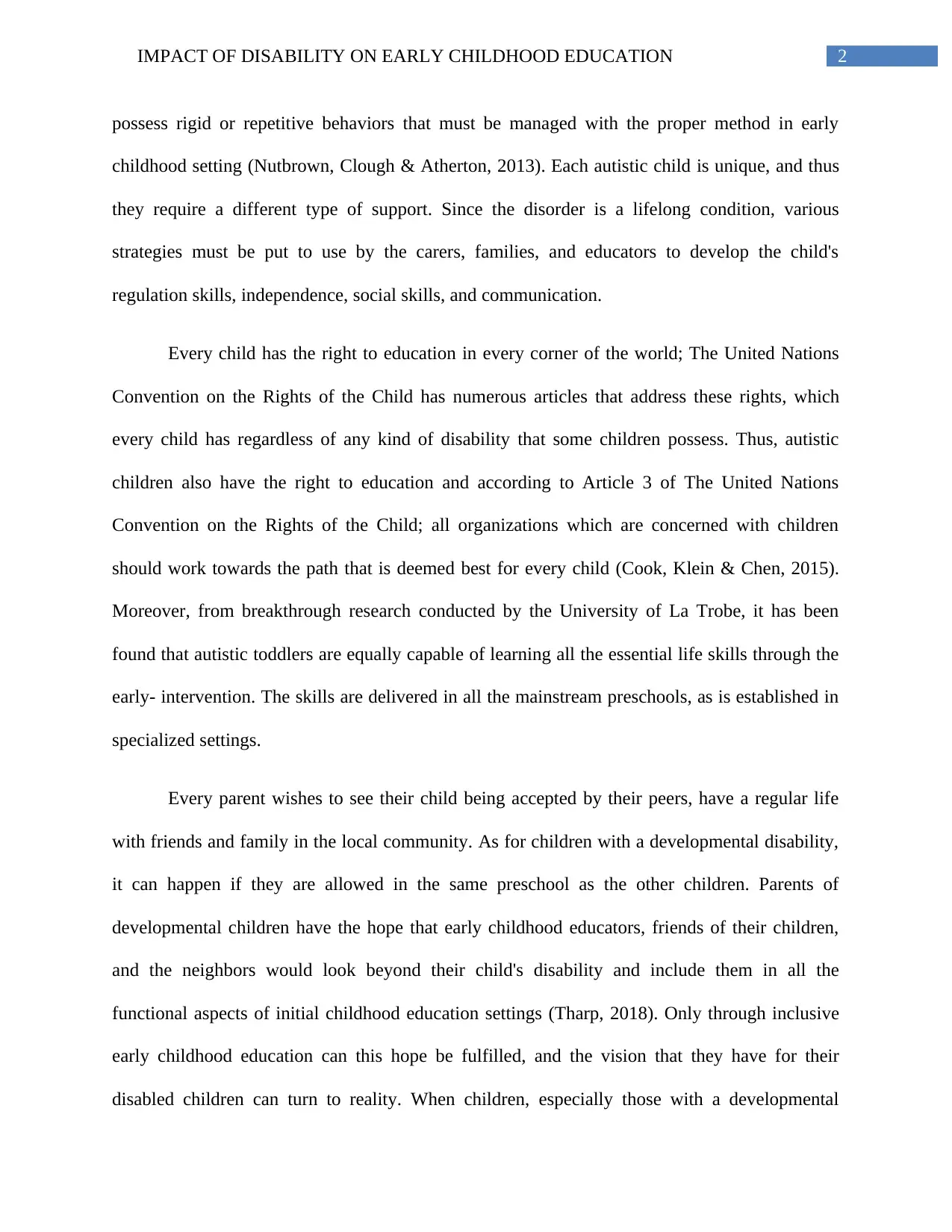
2IMPACT OF DISABILITY ON EARLY CHILDHOOD EDUCATION
possess rigid or repetitive behaviors that must be managed with the proper method in early
childhood setting (Nutbrown, Clough & Atherton, 2013). Each autistic child is unique, and thus
they require a different type of support. Since the disorder is a lifelong condition, various
strategies must be put to use by the carers, families, and educators to develop the child's
regulation skills, independence, social skills, and communication.
Every child has the right to education in every corner of the world; The United Nations
Convention on the Rights of the Child has numerous articles that address these rights, which
every child has regardless of any kind of disability that some children possess. Thus, autistic
children also have the right to education and according to Article 3 of The United Nations
Convention on the Rights of the Child; all organizations which are concerned with children
should work towards the path that is deemed best for every child (Cook, Klein & Chen, 2015).
Moreover, from breakthrough research conducted by the University of La Trobe, it has been
found that autistic toddlers are equally capable of learning all the essential life skills through the
early- intervention. The skills are delivered in all the mainstream preschools, as is established in
specialized settings.
Every parent wishes to see their child being accepted by their peers, have a regular life
with friends and family in the local community. As for children with a developmental disability,
it can happen if they are allowed in the same preschool as the other children. Parents of
developmental children have the hope that early childhood educators, friends of their children,
and the neighbors would look beyond their child's disability and include them in all the
functional aspects of initial childhood education settings (Tharp, 2018). Only through inclusive
early childhood education can this hope be fulfilled, and the vision that they have for their
disabled children can turn to reality. When children, especially those with a developmental
possess rigid or repetitive behaviors that must be managed with the proper method in early
childhood setting (Nutbrown, Clough & Atherton, 2013). Each autistic child is unique, and thus
they require a different type of support. Since the disorder is a lifelong condition, various
strategies must be put to use by the carers, families, and educators to develop the child's
regulation skills, independence, social skills, and communication.
Every child has the right to education in every corner of the world; The United Nations
Convention on the Rights of the Child has numerous articles that address these rights, which
every child has regardless of any kind of disability that some children possess. Thus, autistic
children also have the right to education and according to Article 3 of The United Nations
Convention on the Rights of the Child; all organizations which are concerned with children
should work towards the path that is deemed best for every child (Cook, Klein & Chen, 2015).
Moreover, from breakthrough research conducted by the University of La Trobe, it has been
found that autistic toddlers are equally capable of learning all the essential life skills through the
early- intervention. The skills are delivered in all the mainstream preschools, as is established in
specialized settings.
Every parent wishes to see their child being accepted by their peers, have a regular life
with friends and family in the local community. As for children with a developmental disability,
it can happen if they are allowed in the same preschool as the other children. Parents of
developmental children have the hope that early childhood educators, friends of their children,
and the neighbors would look beyond their child's disability and include them in all the
functional aspects of initial childhood education settings (Tharp, 2018). Only through inclusive
early childhood education can this hope be fulfilled, and the vision that they have for their
disabled children can turn to reality. When children, especially those with a developmental
⊘ This is a preview!⊘
Do you want full access?
Subscribe today to unlock all pages.

Trusted by 1+ million students worldwide
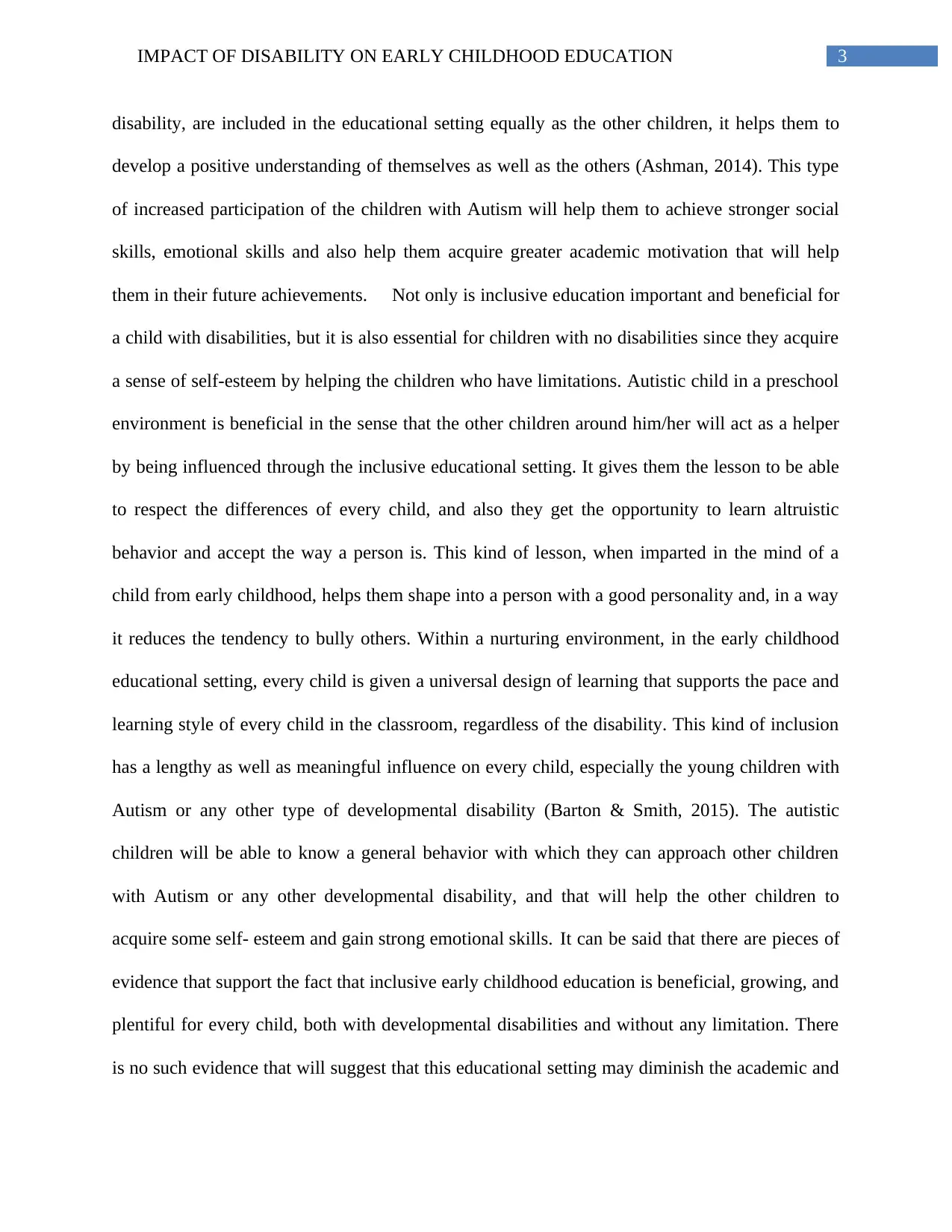
3IMPACT OF DISABILITY ON EARLY CHILDHOOD EDUCATION
disability, are included in the educational setting equally as the other children, it helps them to
develop a positive understanding of themselves as well as the others (Ashman, 2014). This type
of increased participation of the children with Autism will help them to achieve stronger social
skills, emotional skills and also help them acquire greater academic motivation that will help
them in their future achievements. Not only is inclusive education important and beneficial for
a child with disabilities, but it is also essential for children with no disabilities since they acquire
a sense of self-esteem by helping the children who have limitations. Autistic child in a preschool
environment is beneficial in the sense that the other children around him/her will act as a helper
by being influenced through the inclusive educational setting. It gives them the lesson to be able
to respect the differences of every child, and also they get the opportunity to learn altruistic
behavior and accept the way a person is. This kind of lesson, when imparted in the mind of a
child from early childhood, helps them shape into a person with a good personality and, in a way
it reduces the tendency to bully others. Within a nurturing environment, in the early childhood
educational setting, every child is given a universal design of learning that supports the pace and
learning style of every child in the classroom, regardless of the disability. This kind of inclusion
has a lengthy as well as meaningful influence on every child, especially the young children with
Autism or any other type of developmental disability (Barton & Smith, 2015). The autistic
children will be able to know a general behavior with which they can approach other children
with Autism or any other developmental disability, and that will help the other children to
acquire some self- esteem and gain strong emotional skills. It can be said that there are pieces of
evidence that support the fact that inclusive early childhood education is beneficial, growing, and
plentiful for every child, both with developmental disabilities and without any limitation. There
is no such evidence that will suggest that this educational setting may diminish the academic and
disability, are included in the educational setting equally as the other children, it helps them to
develop a positive understanding of themselves as well as the others (Ashman, 2014). This type
of increased participation of the children with Autism will help them to achieve stronger social
skills, emotional skills and also help them acquire greater academic motivation that will help
them in their future achievements. Not only is inclusive education important and beneficial for
a child with disabilities, but it is also essential for children with no disabilities since they acquire
a sense of self-esteem by helping the children who have limitations. Autistic child in a preschool
environment is beneficial in the sense that the other children around him/her will act as a helper
by being influenced through the inclusive educational setting. It gives them the lesson to be able
to respect the differences of every child, and also they get the opportunity to learn altruistic
behavior and accept the way a person is. This kind of lesson, when imparted in the mind of a
child from early childhood, helps them shape into a person with a good personality and, in a way
it reduces the tendency to bully others. Within a nurturing environment, in the early childhood
educational setting, every child is given a universal design of learning that supports the pace and
learning style of every child in the classroom, regardless of the disability. This kind of inclusion
has a lengthy as well as meaningful influence on every child, especially the young children with
Autism or any other type of developmental disability (Barton & Smith, 2015). The autistic
children will be able to know a general behavior with which they can approach other children
with Autism or any other developmental disability, and that will help the other children to
acquire some self- esteem and gain strong emotional skills. It can be said that there are pieces of
evidence that support the fact that inclusive early childhood education is beneficial, growing, and
plentiful for every child, both with developmental disabilities and without any limitation. There
is no such evidence that will suggest that this educational setting may diminish the academic and
Paraphrase This Document
Need a fresh take? Get an instant paraphrase of this document with our AI Paraphraser
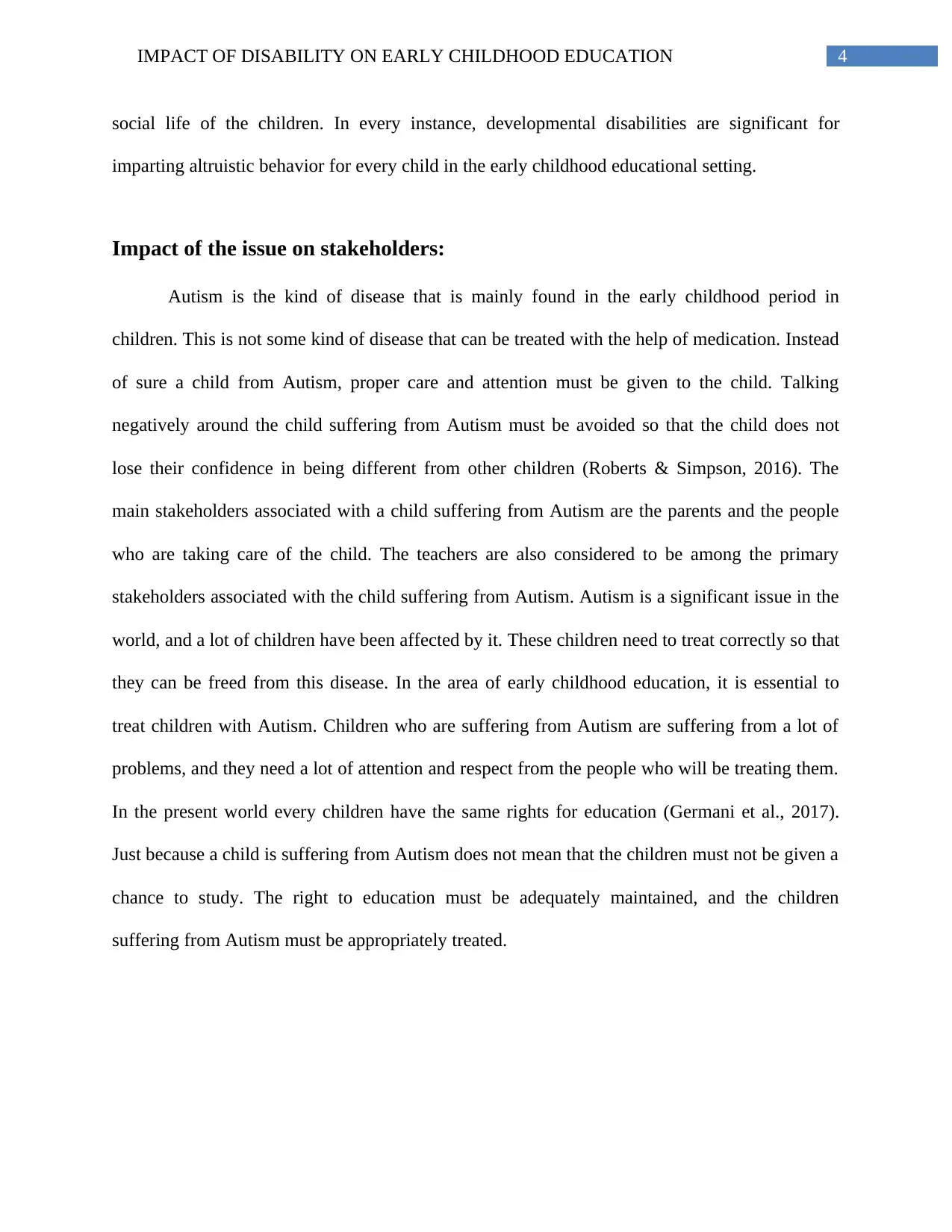
4IMPACT OF DISABILITY ON EARLY CHILDHOOD EDUCATION
social life of the children. In every instance, developmental disabilities are significant for
imparting altruistic behavior for every child in the early childhood educational setting.
Impact of the issue on stakeholders:
Autism is the kind of disease that is mainly found in the early childhood period in
children. This is not some kind of disease that can be treated with the help of medication. Instead
of sure a child from Autism, proper care and attention must be given to the child. Talking
negatively around the child suffering from Autism must be avoided so that the child does not
lose their confidence in being different from other children (Roberts & Simpson, 2016). The
main stakeholders associated with a child suffering from Autism are the parents and the people
who are taking care of the child. The teachers are also considered to be among the primary
stakeholders associated with the child suffering from Autism. Autism is a significant issue in the
world, and a lot of children have been affected by it. These children need to treat correctly so that
they can be freed from this disease. In the area of early childhood education, it is essential to
treat children with Autism. Children who are suffering from Autism are suffering from a lot of
problems, and they need a lot of attention and respect from the people who will be treating them.
In the present world every children have the same rights for education (Germani et al., 2017).
Just because a child is suffering from Autism does not mean that the children must not be given a
chance to study. The right to education must be adequately maintained, and the children
suffering from Autism must be appropriately treated.
social life of the children. In every instance, developmental disabilities are significant for
imparting altruistic behavior for every child in the early childhood educational setting.
Impact of the issue on stakeholders:
Autism is the kind of disease that is mainly found in the early childhood period in
children. This is not some kind of disease that can be treated with the help of medication. Instead
of sure a child from Autism, proper care and attention must be given to the child. Talking
negatively around the child suffering from Autism must be avoided so that the child does not
lose their confidence in being different from other children (Roberts & Simpson, 2016). The
main stakeholders associated with a child suffering from Autism are the parents and the people
who are taking care of the child. The teachers are also considered to be among the primary
stakeholders associated with the child suffering from Autism. Autism is a significant issue in the
world, and a lot of children have been affected by it. These children need to treat correctly so that
they can be freed from this disease. In the area of early childhood education, it is essential to
treat children with Autism. Children who are suffering from Autism are suffering from a lot of
problems, and they need a lot of attention and respect from the people who will be treating them.
In the present world every children have the same rights for education (Germani et al., 2017).
Just because a child is suffering from Autism does not mean that the children must not be given a
chance to study. The right to education must be adequately maintained, and the children
suffering from Autism must be appropriately treated.

5IMPACT OF DISABILITY ON EARLY CHILDHOOD EDUCATION
The stakeholders who are associated with the children suffering from Autism are moistly
affected mentally. Seeing their own child suffering from some kind of disease which is keeping
them apart from the society is a hard sight for any parents in the modern time. Every parent
wants that their child will be getting a good education, but due to the presence of Autism in
them, the child is unable to gather the quality education they are supposed to achieve. The main
problem which has been noticed in the parents whose child is suffering from Autism is that they
are unable to understand what steps they must take to help their child cope up with the problem.
This is where another stakeholder of the child suffering from Autism comes into play, and that
stakeholder is the doctor who will be helping the child cure of the disease (Taneja Johansson,
2014). Teachers, who are specialized in teaching autistic child, are also one of the main
stakeholders who are associated with the child. They take special care in preparing the child, and
they are mostly affected by the results of the child (Murillo et al., 2016). They are concerned
when they see that they are unable to help the child improve in studies and also come up with the
disease. Every stakeholder associated with a child suffering from Autism is affected deeply, and
they strive towards the betterment of the child and make them better in the future.
Justification of Planning Steps
The physical resources which have been suggested for Jake will be helping him to cope
up with the disease. From previous experiences, it has been seen that Jake is a better visual
learner, so steps must be taken to ensure that visual education can be imparted to Jake. The
visual aid will be helping Jake by a considerable margin and make him give knowledge in a
better way. In the present context, it can be said that the education which is imparted to children
suffering from Autism must be done in a better way and they must be allowed to give knowledge
The stakeholders who are associated with the children suffering from Autism are moistly
affected mentally. Seeing their own child suffering from some kind of disease which is keeping
them apart from the society is a hard sight for any parents in the modern time. Every parent
wants that their child will be getting a good education, but due to the presence of Autism in
them, the child is unable to gather the quality education they are supposed to achieve. The main
problem which has been noticed in the parents whose child is suffering from Autism is that they
are unable to understand what steps they must take to help their child cope up with the problem.
This is where another stakeholder of the child suffering from Autism comes into play, and that
stakeholder is the doctor who will be helping the child cure of the disease (Taneja Johansson,
2014). Teachers, who are specialized in teaching autistic child, are also one of the main
stakeholders who are associated with the child. They take special care in preparing the child, and
they are mostly affected by the results of the child (Murillo et al., 2016). They are concerned
when they see that they are unable to help the child improve in studies and also come up with the
disease. Every stakeholder associated with a child suffering from Autism is affected deeply, and
they strive towards the betterment of the child and make them better in the future.
Justification of Planning Steps
The physical resources which have been suggested for Jake will be helping him to cope
up with the disease. From previous experiences, it has been seen that Jake is a better visual
learner, so steps must be taken to ensure that visual education can be imparted to Jake. The
visual aid will be helping Jake by a considerable margin and make him give knowledge in a
better way. In the present context, it can be said that the education which is imparted to children
suffering from Autism must be done in a better way and they must be allowed to give knowledge
⊘ This is a preview!⊘
Do you want full access?
Subscribe today to unlock all pages.

Trusted by 1+ million students worldwide
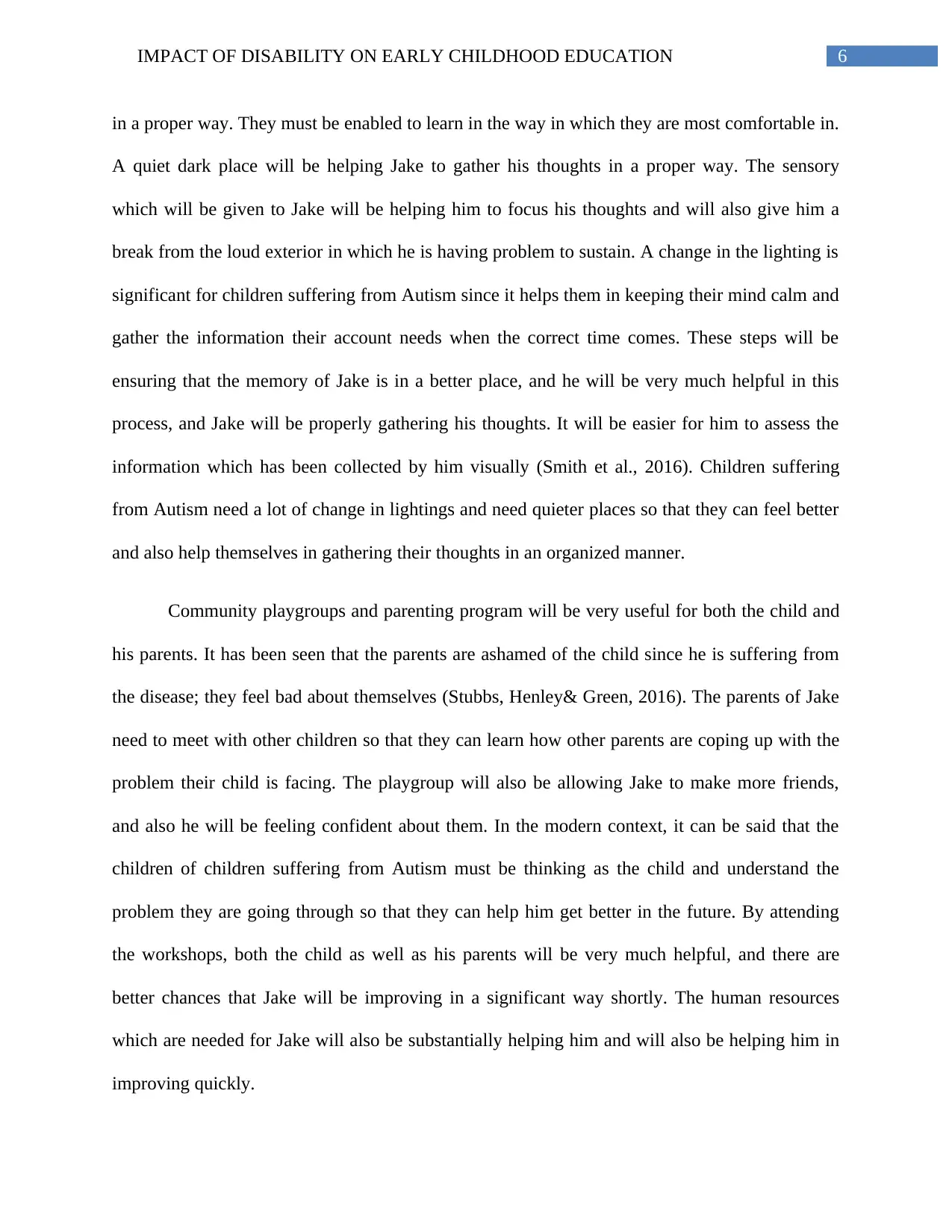
6IMPACT OF DISABILITY ON EARLY CHILDHOOD EDUCATION
in a proper way. They must be enabled to learn in the way in which they are most comfortable in.
A quiet dark place will be helping Jake to gather his thoughts in a proper way. The sensory
which will be given to Jake will be helping him to focus his thoughts and will also give him a
break from the loud exterior in which he is having problem to sustain. A change in the lighting is
significant for children suffering from Autism since it helps them in keeping their mind calm and
gather the information their account needs when the correct time comes. These steps will be
ensuring that the memory of Jake is in a better place, and he will be very much helpful in this
process, and Jake will be properly gathering his thoughts. It will be easier for him to assess the
information which has been collected by him visually (Smith et al., 2016). Children suffering
from Autism need a lot of change in lightings and need quieter places so that they can feel better
and also help themselves in gathering their thoughts in an organized manner.
Community playgroups and parenting program will be very useful for both the child and
his parents. It has been seen that the parents are ashamed of the child since he is suffering from
the disease; they feel bad about themselves (Stubbs, Henley& Green, 2016). The parents of Jake
need to meet with other children so that they can learn how other parents are coping up with the
problem their child is facing. The playgroup will also be allowing Jake to make more friends,
and also he will be feeling confident about them. In the modern context, it can be said that the
children of children suffering from Autism must be thinking as the child and understand the
problem they are going through so that they can help him get better in the future. By attending
the workshops, both the child as well as his parents will be very much helpful, and there are
better chances that Jake will be improving in a significant way shortly. The human resources
which are needed for Jake will also be substantially helping him and will also be helping him in
improving quickly.
in a proper way. They must be enabled to learn in the way in which they are most comfortable in.
A quiet dark place will be helping Jake to gather his thoughts in a proper way. The sensory
which will be given to Jake will be helping him to focus his thoughts and will also give him a
break from the loud exterior in which he is having problem to sustain. A change in the lighting is
significant for children suffering from Autism since it helps them in keeping their mind calm and
gather the information their account needs when the correct time comes. These steps will be
ensuring that the memory of Jake is in a better place, and he will be very much helpful in this
process, and Jake will be properly gathering his thoughts. It will be easier for him to assess the
information which has been collected by him visually (Smith et al., 2016). Children suffering
from Autism need a lot of change in lightings and need quieter places so that they can feel better
and also help themselves in gathering their thoughts in an organized manner.
Community playgroups and parenting program will be very useful for both the child and
his parents. It has been seen that the parents are ashamed of the child since he is suffering from
the disease; they feel bad about themselves (Stubbs, Henley& Green, 2016). The parents of Jake
need to meet with other children so that they can learn how other parents are coping up with the
problem their child is facing. The playgroup will also be allowing Jake to make more friends,
and also he will be feeling confident about them. In the modern context, it can be said that the
children of children suffering from Autism must be thinking as the child and understand the
problem they are going through so that they can help him get better in the future. By attending
the workshops, both the child as well as his parents will be very much helpful, and there are
better chances that Jake will be improving in a significant way shortly. The human resources
which are needed for Jake will also be substantially helping him and will also be helping him in
improving quickly.
Paraphrase This Document
Need a fresh take? Get an instant paraphrase of this document with our AI Paraphraser
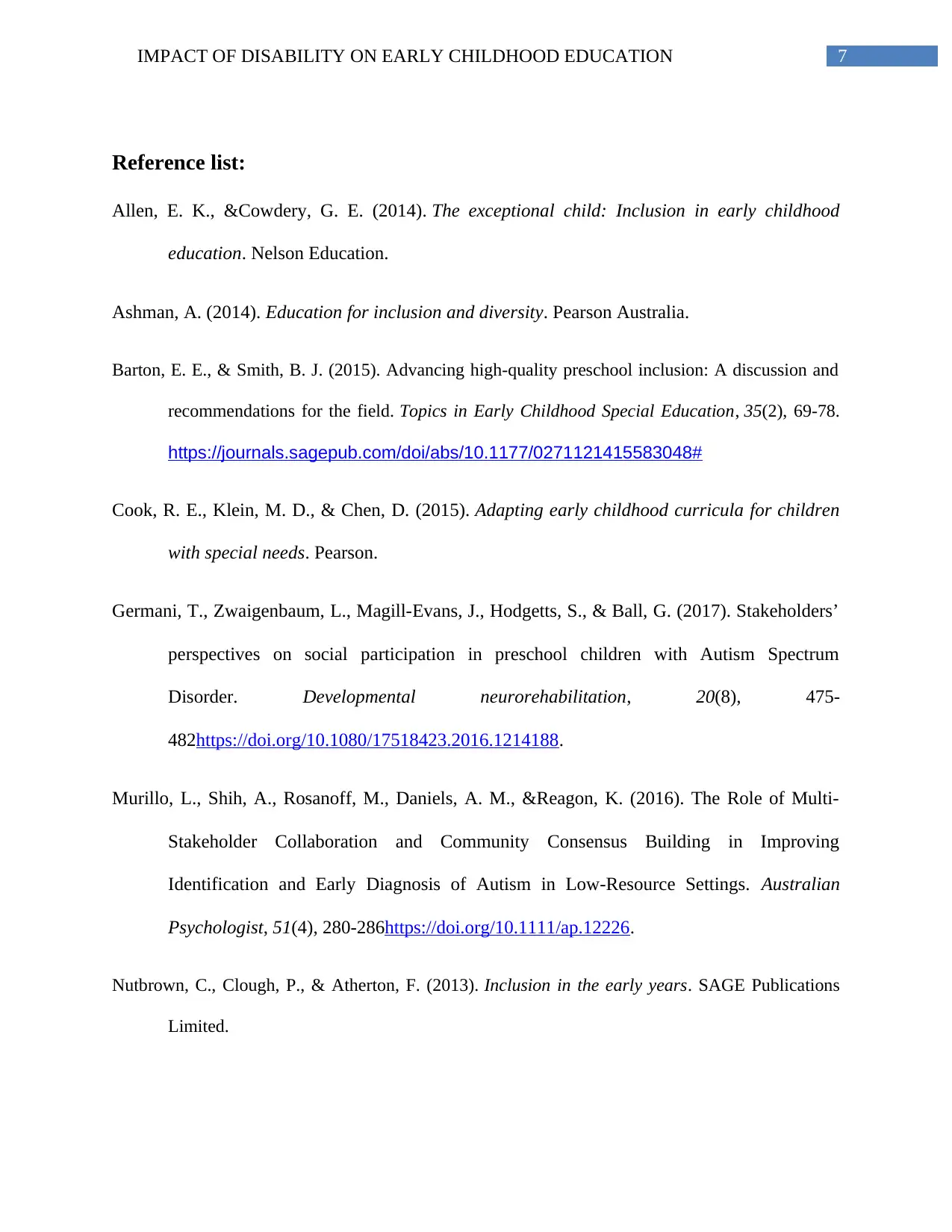
7IMPACT OF DISABILITY ON EARLY CHILDHOOD EDUCATION
Reference list:
Allen, E. K., &Cowdery, G. E. (2014). The exceptional child: Inclusion in early childhood
education. Nelson Education.
Ashman, A. (2014). Education for inclusion and diversity. Pearson Australia.
Barton, E. E., & Smith, B. J. (2015). Advancing high-quality preschool inclusion: A discussion and
recommendations for the field. Topics in Early Childhood Special Education, 35(2), 69-78.
https://journals.sagepub.com/doi/abs/10.1177/0271121415583048#
Cook, R. E., Klein, M. D., & Chen, D. (2015). Adapting early childhood curricula for children
with special needs. Pearson.
Germani, T., Zwaigenbaum, L., Magill-Evans, J., Hodgetts, S., & Ball, G. (2017). Stakeholders’
perspectives on social participation in preschool children with Autism Spectrum
Disorder. Developmental neurorehabilitation, 20(8), 475-
482https://doi.org/10.1080/17518423.2016.1214188.
Murillo, L., Shih, A., Rosanoff, M., Daniels, A. M., &Reagon, K. (2016). The Role of Multi‐
Stakeholder Collaboration and Community Consensus Building in Improving
Identification and Early Diagnosis of Autism in Low‐Resource Settings. Australian
Psychologist, 51(4), 280-286https://doi.org/10.1111/ap.12226.
Nutbrown, C., Clough, P., & Atherton, F. (2013). Inclusion in the early years. SAGE Publications
Limited.
Reference list:
Allen, E. K., &Cowdery, G. E. (2014). The exceptional child: Inclusion in early childhood
education. Nelson Education.
Ashman, A. (2014). Education for inclusion and diversity. Pearson Australia.
Barton, E. E., & Smith, B. J. (2015). Advancing high-quality preschool inclusion: A discussion and
recommendations for the field. Topics in Early Childhood Special Education, 35(2), 69-78.
https://journals.sagepub.com/doi/abs/10.1177/0271121415583048#
Cook, R. E., Klein, M. D., & Chen, D. (2015). Adapting early childhood curricula for children
with special needs. Pearson.
Germani, T., Zwaigenbaum, L., Magill-Evans, J., Hodgetts, S., & Ball, G. (2017). Stakeholders’
perspectives on social participation in preschool children with Autism Spectrum
Disorder. Developmental neurorehabilitation, 20(8), 475-
482https://doi.org/10.1080/17518423.2016.1214188.
Murillo, L., Shih, A., Rosanoff, M., Daniels, A. M., &Reagon, K. (2016). The Role of Multi‐
Stakeholder Collaboration and Community Consensus Building in Improving
Identification and Early Diagnosis of Autism in Low‐Resource Settings. Australian
Psychologist, 51(4), 280-286https://doi.org/10.1111/ap.12226.
Nutbrown, C., Clough, P., & Atherton, F. (2013). Inclusion in the early years. SAGE Publications
Limited.
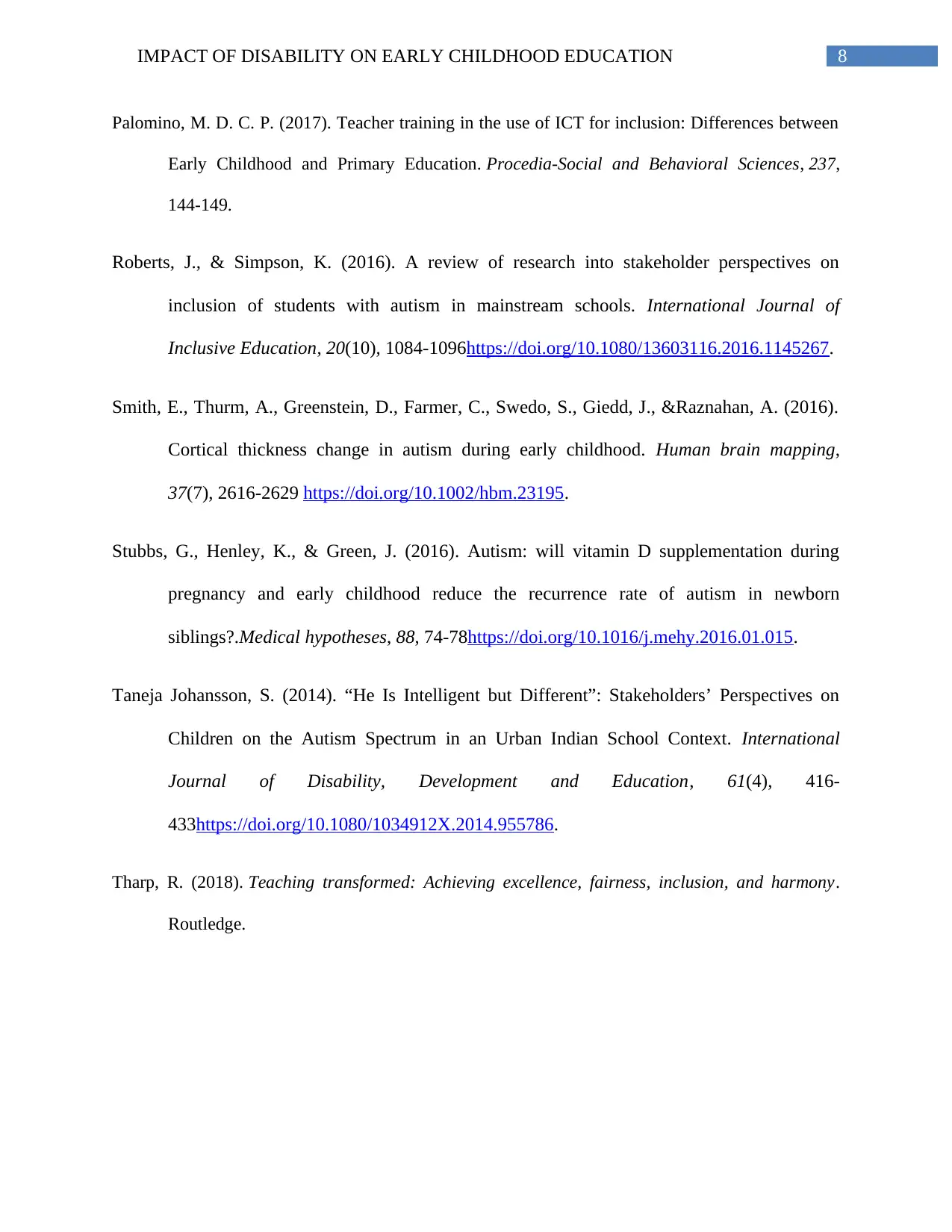
8IMPACT OF DISABILITY ON EARLY CHILDHOOD EDUCATION
Palomino, M. D. C. P. (2017). Teacher training in the use of ICT for inclusion: Differences between
Early Childhood and Primary Education. Procedia-Social and Behavioral Sciences, 237,
144-149.
Roberts, J., & Simpson, K. (2016). A review of research into stakeholder perspectives on
inclusion of students with autism in mainstream schools. International Journal of
Inclusive Education, 20(10), 1084-1096https://doi.org/10.1080/13603116.2016.1145267.
Smith, E., Thurm, A., Greenstein, D., Farmer, C., Swedo, S., Giedd, J., &Raznahan, A. (2016).
Cortical thickness change in autism during early childhood. Human brain mapping,
37(7), 2616-2629 https://doi.org/10.1002/hbm.23195.
Stubbs, G., Henley, K., & Green, J. (2016). Autism: will vitamin D supplementation during
pregnancy and early childhood reduce the recurrence rate of autism in newborn
siblings?.Medical hypotheses, 88, 74-78https://doi.org/10.1016/j.mehy.2016.01.015.
Taneja Johansson, S. (2014). “He Is Intelligent but Different”: Stakeholders’ Perspectives on
Children on the Autism Spectrum in an Urban Indian School Context. International
Journal of Disability, Development and Education, 61(4), 416-
433https://doi.org/10.1080/1034912X.2014.955786.
Tharp, R. (2018). Teaching transformed: Achieving excellence, fairness, inclusion, and harmony.
Routledge.
Palomino, M. D. C. P. (2017). Teacher training in the use of ICT for inclusion: Differences between
Early Childhood and Primary Education. Procedia-Social and Behavioral Sciences, 237,
144-149.
Roberts, J., & Simpson, K. (2016). A review of research into stakeholder perspectives on
inclusion of students with autism in mainstream schools. International Journal of
Inclusive Education, 20(10), 1084-1096https://doi.org/10.1080/13603116.2016.1145267.
Smith, E., Thurm, A., Greenstein, D., Farmer, C., Swedo, S., Giedd, J., &Raznahan, A. (2016).
Cortical thickness change in autism during early childhood. Human brain mapping,
37(7), 2616-2629 https://doi.org/10.1002/hbm.23195.
Stubbs, G., Henley, K., & Green, J. (2016). Autism: will vitamin D supplementation during
pregnancy and early childhood reduce the recurrence rate of autism in newborn
siblings?.Medical hypotheses, 88, 74-78https://doi.org/10.1016/j.mehy.2016.01.015.
Taneja Johansson, S. (2014). “He Is Intelligent but Different”: Stakeholders’ Perspectives on
Children on the Autism Spectrum in an Urban Indian School Context. International
Journal of Disability, Development and Education, 61(4), 416-
433https://doi.org/10.1080/1034912X.2014.955786.
Tharp, R. (2018). Teaching transformed: Achieving excellence, fairness, inclusion, and harmony.
Routledge.
⊘ This is a preview!⊘
Do you want full access?
Subscribe today to unlock all pages.

Trusted by 1+ million students worldwide
1 out of 9
Related Documents
Your All-in-One AI-Powered Toolkit for Academic Success.
+13062052269
info@desklib.com
Available 24*7 on WhatsApp / Email
![[object Object]](/_next/static/media/star-bottom.7253800d.svg)
Unlock your academic potential
Copyright © 2020–2026 A2Z Services. All Rights Reserved. Developed and managed by ZUCOL.





